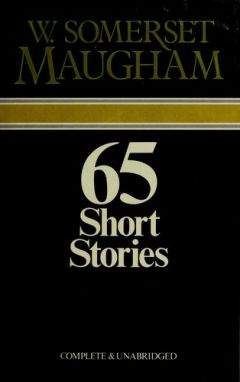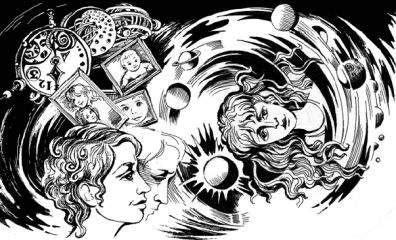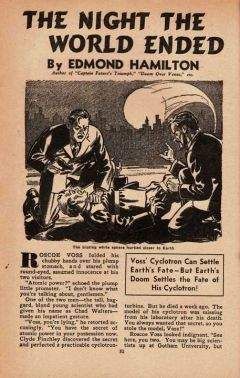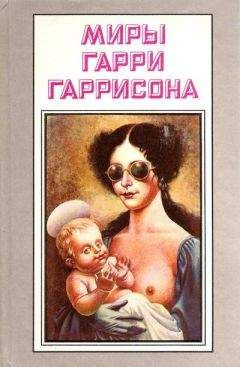Somerset Maugham - Sixty-Five Short Stories

Скачивание начинается... Если скачивание не началось автоматически, пожалуйста нажмите на эту ссылку.
Жалоба
Напишите нам, и мы в срочном порядке примем меры.
Описание книги "Sixty-Five Short Stories"
Описание и краткое содержание "Sixty-Five Short Stories" читать бесплатно онлайн.
'Buck up, darling. You can't refuse a sum like that. Why, it'll keep us all the winter and we shan't have to do a thing. After all there are only four more days to the end of July and then it's only August.'
'No, no, no. I'm frightened. I don't want to die, Syd. I love you.'
'I know you do, darling, and I love you. Why, since we married I've never looked at another woman. We've never had money like this before and we shall never get it again. You know what these things are, we're a riot now, but we can't expect it to go on for ever. We've got to strike while the iron's hot.'
'D'you want me to die, Syd?'
'Don't talk so silly. Why, where should I be without you? You mustn't give way like this. You've got your self-respect to think of. You're famous all over the world.'
'Like the human cannon-ball was,' she cried with a laugh of fury.
'That damned old woman,' he thought.
He knew that was the last straw. Bad luck, Stella taking it like that.
'That was an eye-opener to me,' she went on. 'What do they come and see me over and over again for? On the chance they'll see me kill myself. And a week after I'm dead they'll have forgotten even my name. That's what the public is. When I looked at that painted old hag I saw it all. Oh, Syd, I'm so miserable.' She threw her arms round his neck and pressed her face to his. 'Syd, it's no good, I can't do it again.'
'Tonight, d'you mean? If you really feel like that about it, I'll tell Espinel you've had a fainting fit. I daresay it'll be all right just for once.'
'I don't mean tonight, I mean never.'
She felt him stiffen a little.
'Syd dear, don't think I'm being silly. It's not just today, it's been growing on me. I can't sleep at night thinking of it, and when I do drop off I see myself standing at the top of the ladder and looking down. Tonight I could hardly get up it, I was trembling so, and when you lit the flames and said go, something seemed to be holding me back. I didn't even know I'd jumped. My mind was a blank till I found myself on the platform and heard them clapping. Syd, if you loved me you wouldn't want me to go through such torture.'
He sighed. His own eyes were wet with tears. For he loved her devotedly.
'You know what it means,' he said. 'The old life. Marathons and all.'
'Anything's better than this.'
The old life. They both remembered it. Syd had been a dancing gigolo since he was eighteen, he was very good-looking in his dark Spanish way and full of life, old women and middle-aged women were glad to pay to dance with him, and he was never out of work. He had drifted from England to the Continent and there he had stayed, going from hotel to hotel, to the Riviera in the winter, to watering-places in France in the summer. It wasn't a bad life they led, there were generally two or three of them together, the men, and they shared a room in cheap lodgings. They didn't have to get up till late and they only dressed in time to go to the hotel at twelve to dance with stout women who wanted to get their weight down. Then they were free till five, when they went to the hotel again and sat at a table, the three of them together, keeping a sharp eye open for anyone who looked a likely client. They had their regular customers. At night they went to the restaurant and the house provided them with quite a decent meal. Between the courses they danced. It was good money. They generally got fifty or a hundred francs from anyone they danced with. Sometimes a rich woman, after dancing a good deal with one of them for two or three nights, would give him as much as a thousand francs. Sometimes a middle-aged woman would ask one to spend a night with her, and he would get two hundred and fifty francs for that. There was always the chance of a silly old fool losing her head, and then there were platinum and sapphire rings, cigarette-cases, clothes, and a wristwatch to be got. One of Syd's friends had married one of them, who was old enough to be his mother, but she gave him a car and money to gamble with, and they lived in a beautiful villa at Biarritz. Those were the good days when everybody had money to burn. The slump came and hit the gigolos hard. The hotels were empty, and the clients didn't seem to want to pay for the pleasure of dancing with a nice-looking young fellow. Often and often Syd passed a whole day without earning the price of a drink, and more than once a fat old girl who weighed a ton had had the nerve to give him ten francs. His expenses didn't go down, for he had to be smartly dressed or the manager of the hotel made remarks, washing cost a packet, and you'd be surprised the amount of linen he needed; then shoes, those floors were terribly hard on shoes, and they had to look new. He had his room to pay for and his lunch.
It was then he met Stella. It was at Evian, and the season was disastrous. She was a swimming instructress. She was Australian, and a beautiful diver. She gave exhibitions every morning and afternoon. At night she was engaged to dance at the hotel. They dined together at a little table in the restaurant apart from the guests, and when the band began to play they danced together to induce the customers to come on to the floor. But often no one followed them and they danced by themselves. Neither of them got anything much in the way of paying partners. They fell in love with one another, and at the end of the season got married.
They had never regretted it. They had gone through hard times. Even though for business reasons (elderly ladies didn't so much like the idea of dancing with a married man when his wife was there) they concealed their marriage, it was not so easy to get a hotel job for the pair of them, and Syd was far from being able to earn enough to keep Stella, even in the most modest pension, without working. The gigolo business had gone to pot. They went to Paris and learnt a dancing act, but the competition was fearful and cabaret engagements were very hard to get. Stella was a good ballroom dancer, but the rage was for acrobatics, and however much they practised she never managed to do anything startling. The public was sick of the apache turn. They were out of a job for weeks at a time. Syd's wrist-watch, his gold cigarette-case, his platinum ring, all went up the spout. At last they found themselves in Nice reduced to such straits that Syd had to pawn his evening clothes. It was a catastrophe. They were forced to enter for the Marathon that an enterprising manager was starting. Twenty-four hours a day they danced, resting every hour for fifteen minutes. It was frightful. Their legs ached, their feet were numb. For long periods they were unconscious of what they were doing. They just kept time to the music, exerting themselves as little as possible. They made a little money, people gave them sums of a hundred francs, or two hundred, to encourage them, and sometimes to attract attention they roused themselves to give an exhibition dance. If the public was in a good humour this might bring in a decent sum. They grew terribly tired. On the eleventh day Stella fainted and had to give up. Syd went on by himself, moving, moving without pause, grotesquely, without a partner. That was the worst time they had ever had. It was the final degradation. It had left with them a recollection of horror and misery.
But it was then that Syd had his inspiration. It had come to him while he was slowly going round the hall by himself. Stella always said she could dive in a saucer. It was just a trick.
'Funny how ideas come,' he said afterwards. 'Like a flash of lightning.'
He suddenly remembered having seen a boy set fire to some petrol that had been spilt on the pavement, and the sudden blaze-up. For of course it was the flames on the water and the spectacular dive into them that had caught the public fancy. He stopped dancing there and then; he was too excited to go on. He talked it over with Stella, and she was enthusiastic. He wrote to an agent who was a friend of his; everyone liked Syd, he was a nice little man, and the agent put up the money for the apparatus. He got them an engagement at a circus in Paris, and the turn was a success. They were made. Engagements followed here and there, Syd bought himself an entire outfit of new clothes, and the climax came when they got a booking for the summer casino on the coast. It was no exaggeration of Syd's when he said that Stella was a riot.
'All our troubles are over, old girl,' he said fondly. 'We can put a bit by now for a rainy day, and when the public's sick of this I'll just think of something else.'
And now, without warning, at the top of their boom, Stella wanted to chuck it. He didn't know what to say to her. It broke his heart to see her so unhappy. He loved her more now even than when he had married her. He loved her because of all they'd gone through together; after all, for five days once they'd had nothing to eat but a hunk of bread each and a glass of milk, and he loved her because she'd taken him out of all that; he had good clothes to wear again and his three meals a day. He couldn't look at her; the anguish in her dear grey eyes was more than he could bear. Timidly she stretched out her hand and touched his. He gave a deep sigh.
'You know what it means, honey. Our connexion in the hotels has gone west, and the business is finished, anyway. What there is'll go to people younger than us. You know what these old women are as well as I do; it's a boy they want, and besides, I'm not tall enough really. It didn't matter so much when I was a kid. It's no good saying I don't look my age because I do.'
'Perhaps we can get into pictures.'
He shrugged his shoulders. They'd tried that before when they were down and out.
'I wouldn't mind what I did. I'd serve in a shop.'
'D'you think jobs can be had for the asking?'
She began to cry again.
'Don't, honey. It breaks my heart.'
'We've got a bit put by.'
'I know we have. Enough to last us six months. And then it'll mean starvation. First popping the bits and pieces, and then the clothes'll have to go, same as they did before. And then dancing in lowdown joints for our supper and fifty francs a night. Out of a job for weeks together. And Marathons whenever we hear of one. And how long will the public stand for them?'
'I know you think I'm unreasonable, Syd.'
He turned and looked at her now. There were tears in her eyes. He smiled, and the smile he gave her was charming and tender.
'No, I don't, ducky. I want to make you happy. After all, you're all I've got. I love you.'
He took her in his arms and held her. He could feel the beating of her heart. If Stella felt like that about it, well, he must just make the best of it. After all, supposing she were killed? No, no, let her chuck it and be damned to the money. She made a little movement.
'What is it, honey?'
She released herself and stood up. She went over to the dressing-table.
'I expect it's about time for me to be getting ready,' she said.
He started to his feet.
'You're not going to do a show tonight?'
'Tonight, and every night till I kill myself. What else is there? I know you're right, Syd. I can't go back to all that other, stinking rooms in fifth-rate hotels and not enough to eat. Oh, that Marathon. Why did you bring that up? Being tired and dirty for days at a time and then having to give up because flesh and blood just couldn't stand it. Perhaps I can go on another month and then there'll be enough to give you a chance of looking round.'
'No, darling. I can't stand for that. Chuck it. We'll manage somehow. We starved before; we can starve again.'
She slipped out of her clothes, and for a moment stood naked but for her stockings, looking at herself in the glass. She gave her reflection a hard smile.
'I mustn't disappoint my public,' she sniggered.
The Voice of the Turtle
For some time I could not make up my mind if I liked Peter Melrose or not. He had had a novel published that had caused some stir among the rather dreary but worthy people who are always on the lookout for new talent. Elderly gentlemen with nothing much to do but go to luncheon parties praised it with girlish enthusiasm, and wiry little women who didn't get on with their husbands thought it showed promise. I read a few reviews. They contradicted one another freely. Some of the critics claimed that with this first novel the author had sprung into the front rank of English novelists: others reviled it. I did not read it. I have learnt by experience that when a book makes a sensation it is just as well to wait a year before you read it. It is astonishing how many books then you need not read at all. But it chanced that one day I met Peter Melrose. With some misgiving I had accepted an invitation to a sherry party. It was in the top flat of a converted house in Bloomsbury, and I was a trifle out of breath when I had climbed four flights of stairs. My hostesses were two women, much over life-size, in early middle life, the sort of women who know all about the insides of motor-cars and like a good tramp in the rain, but very feminine for all that, fond of eating out of paper bags. The drawing-room, which they called 'our workshop', though being of independent means neither had ever done a stroke of work in her life, was large and bare, furnished with rustless-steel chairs, which looked as though they could with difficulty support the very substantial weight of their owners, glass-topped tables, and a vast divan covered with zebra-skin. On the walls were book-shelves, and pictures by the better-known English imitators of Cezanne, Braque, and Picasso. In the shelves, besides a number of 'curious' books of the eighteenth century (for pornography is ageless) there were only the works of living authors, mostly first editions, and it was indeed to sign some of my own that I had been asked to the party.
It was quite small. There was but one other woman, who might have been a younger sister of my hostesses, for, though stout, she was not quite so stout, though tall, not quite so tall, and though hearty, not quite so hearty. I did not catch her name, but she answered to that of Boofuls. The only man besides myself was Peter Melrose. He was quite young, twenty-two or twenty-three, of the middle height, but with an ungainly figure that made him look squat. He had a reddish skin that seemed to fit over the bones of his face too tightly, a rather large Semitic nose, though he was not a Jew, and alert green eyes under bushy eyebrows. His brown hair, cut very short, was scurfy. He was dressed in the brown Norfolk jacket and grey flannel trousers that are worn by the art students who wander hatless along King's Road, Chelsea. An uncouth young man. Nor was there much to attract in his manner. He was self-assertive, disputatious and intolerant. He had a hearty contempt for his fellow-writers which he expressed with zest. The satisfaction he gave me by his breezy attacks on reputations which for my part I considered exaggerated, but prudently held my tongue about, was only lessened by the conviction that no sooner was my back turned than he would tear my own to shreds. He talked well. He was amusing and sometimes witty. I should have laughed at his sallies more easily if those three ladies had not been so unreasonably convulsed by them. They roared with laughter at what he said, whether it was funny or whether it was inept. He said many silly things, for he talked without stopping, but he also said some very clever ones. He had a point of view, crude and not so original as he thought, but sincere. But the most striking thing about him was his eager, impetuous vitality; it was like a hot flame that burnt him with an unendurable fury. It even shed a glow on those about him. He had something, if only that, and when I left it was with a slight sense of curiosity at what would come of him. I did not know if he had talent; so many young things can write a clever novel-that means nothing; but it seemed to me that as a man he was not quite like everybody else. He was the sort of person who at thirty, when time had softened his asperity and experience had taught him that he was not quite so intelligent as he thought, would turn into an interesting and agreeable fellow. But I never expected to see him again.
Подписывайтесь на наши страницы в социальных сетях.
Будьте в курсе последних книжных новинок, комментируйте, обсуждайте. Мы ждём Вас!
Похожие книги на "Sixty-Five Short Stories"
Книги похожие на "Sixty-Five Short Stories" читать онлайн или скачать бесплатно полные версии.
Мы рекомендуем Вам зарегистрироваться либо войти на сайт под своим именем.
Отзывы о "Somerset Maugham - Sixty-Five Short Stories"
Отзывы читателей о книге "Sixty-Five Short Stories", комментарии и мнения людей о произведении.














